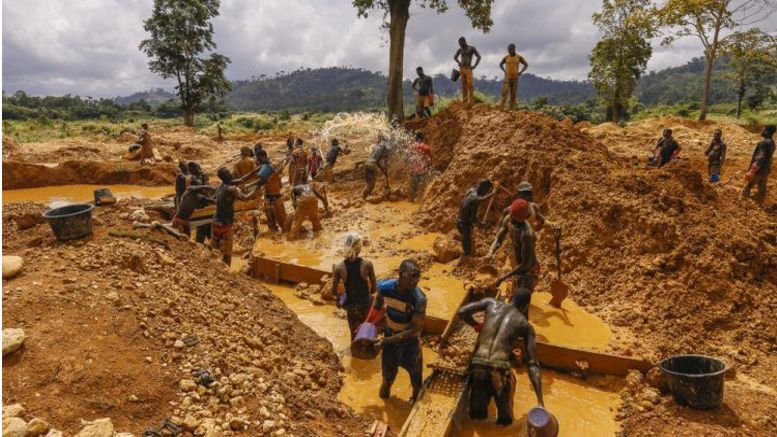Kwabena Adu Koranteng writes
The time has come and the time is now to declare a state of emergency to tackle the menace of illegal mining, popularly called ‘galamsey’, and bring its activities to an end.
The political will of the President, John Dramani Mahama is needed to undertake such crucial decision in the interest of the state, the people, and future generations.
Declaring a state of emergency and banning all sorts of small-scale mining for a period of two years would help protect the environment, forest reserves, biodiversity, rivers, and water bodies of the previous state.
If President Mahama is willing to end illegal mining, the steps are easy. He should just declare a state of emergency and ban the activities for two years just as he promised during his campaign towards the 2024 general elections.
The point however is that he cannot do so because almost all the financiers of his political party, the National Democratic Congress (NDC), and some of his Members of Parliament are allegedly small-scale miners.
Small-scale miners for some years now have developed the zeal in financing activities of the National Democratic Congress to help protect their businesses when issues come to the worst.
A state of emergency is seriously needed at this time that illegal mining activities are destroying everything in the country from forest reserves through rivers and water bodies to even the sea. Their activities are polluting the sea and making it dangerous for even fish consumption in the sea as the polluted rivers end up in the sea.
The act of illegal mining activities has worsened today more than ever as many supporters of the National Democratic Congress have massed up and joined the bandwagon in illegal mining.
According to the Munich Personal RePEc Archive, Illegal mining practices, such as the use of mercury and improper land management, contribute to environmental degradation. Deforestation, land degradation, and water pollution caused by illegal mining activities adversely impact agricultural productivity and other economic activities dependent on natural resources.
The loss of productive land and environmental resources limits the potential for sustained economic growth. Illegal mining operations often involve the clearing of large areas of forests and vegetation to access mineral deposits.
This deforestation leads to the loss of critical habitat for wildlife, reduces carbon sequestration, and disrupts ecological balance. The removal of vegetation also contributes to soil erosion and land degradation, making the affected areas less suitable for agriculture and other land-based economic activities.
Furthermore, illegal miners often use environmentally harmful practices, such as the improper use of mercury in gold extraction. Mercury is a highly toxic substance that pollutes water bodies, contaminates soil, and accumulates in the food chain.
This poses significant risks to human health and the environment. The use of mercury in illegal mining not only pollutes water sources but also affects downstream communities and ecosystems that rely on these water bodies for their livelihoods. The environmental degradation caused by illegal mining has severe implications for agricultural productivity and other natural resource-dependent sectors. Polluted water sources affect irrigation systems and reduce the availability of clean water for agricultural activities. Soil contamination and erosion further degrade the quality of arable land, impacting crop yields and agricultural productivity.

The loss of productive land and environmental resources limits the potential for sustained economic growth in Ghana. Agriculture, forestry, and other natural resource-based sectors play a significant role in the country’s economy.
The degradation of these sectors due to illegal mining activities undermines their capacity to contribute to employment generation, export earnings, and food security. Addressing environmental degradation and loss of productivity requires a comprehensive approach. Strengthening environmental regulations, enforcing responsible mining practices, and promoting sustainable land management are crucial steps.
Additionally, promoting alternative livelihood opportunities, such as sustainable agriculture and eco-tourism, can help mitigate the negative economic impacts caused by the loss of productive land. Increased Economic Vulnerability: Reliance on illegal mining activities for livelihoods creates economic vulnerability for individuals and communities involved.
Illegal mining is often characterized by irregular income, lack of social protection, and limited access to financial services. This vulnerability undermines long-term economic stability and resilience, inhibiting broader economic development
Engaging in illegal mining activities can be a response to economic challenges and limited opportunities in other sectors. However, the nature of illegal mining work exposes individuals and communities to economic vulnerability.
Irregular income is a common feature, as the profitability of illegal mining operations fluctuates based on factors such as ore quality, market prices, and law enforcement activities.
Furthermore, individuals involved in illegal mining often lack social protection measures such as health insurance, pension schemes, and workplace safety regulations.
The absence of formal employment arrangements means that miners and their families do not benefit from the social security nets typically available in the formal sector. This leaves them exposed to various risks, including health emergencies, injuries, and financial hardships supporting entrepreneurship can help individuals transition to more sustainable and legitimate economic activities.
Additionally, social protection programs and policies that extend social security benefits to informal sector workers can provide a safety net and enhance economic resilience. A decline in Productive Investments.
The presence of illegal mining activities can deter productive investments in other sectors of the economy. With the allure of quick profits from illegal mining, individuals may divert their resources and efforts away from productive sectors such as agriculture, manufacturing, and services. This diversion of resources limits the potential for diversified economic growth and hampers long-term development.
Illegal mining activities often offer higher short-term returns compared to investments in other sectors that require longer-term commitments and potentially carry higher risks. The lure of quick profits from illegal mining can lead individuals to prioritize mining activities over investing in more productive sectors of the economy.
This diversion of resources and labour away from sectors such as agriculture, manufacturing, and services can impede the growth and development of these sectors. Agriculture, for example, is a crucial sector in Ghana’s economy, employing a significant portion of the population and contributing to food security and export earnings.
However, the presence of illegal mining can lead to a decline in agricultural investments as individuals opt for potentially higher immediate returns from mining activities.
This can result in reduced agricultural productivity, lower food production, and increased reliance on imports, affecting both rural livelihoods and national economic stability.
Similarly, the manufacturing and services sectors may experience limited investments as resources are redirected towards illegal mining operations.
The diversion of financial capital, skilled labour, and entrepreneurial efforts to the mining sector hampers the growth of industries that can contribute to value addition, employment creation, and economic diversification.
This dependency on the mining sector and the neglect of other sectors can make the economy more vulnerable to commodity price fluctuations and hinder sustainable long-term development. To address the decline in productive investments, it is essential to create an enabling environment for investment in diverse sectors of the economy.
This includes implementing supportive policies, providing access to credit and financial services, promoting entrepreneurship, and facilitating technology transfer and innovation.
By encouraging investments in agriculture, manufacturing, and services, Ghana can foster economic diversification, enhance job creation, and reduce dependency on the mining sector. Inefficiencies and Economic Inefficacy: Illegal mining operations often lack proper planning, technology, and efficient practices. Enditem
Share Us



